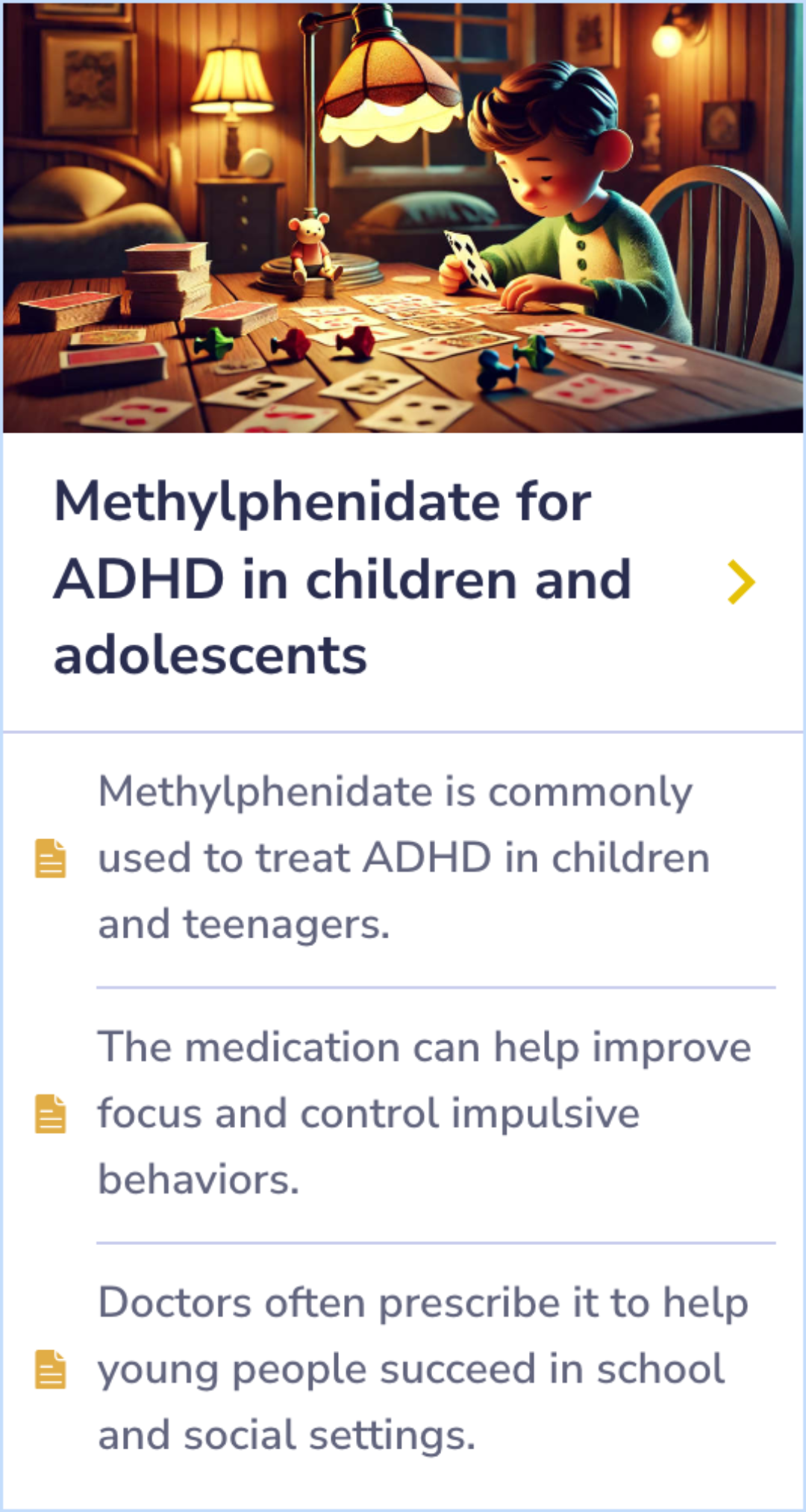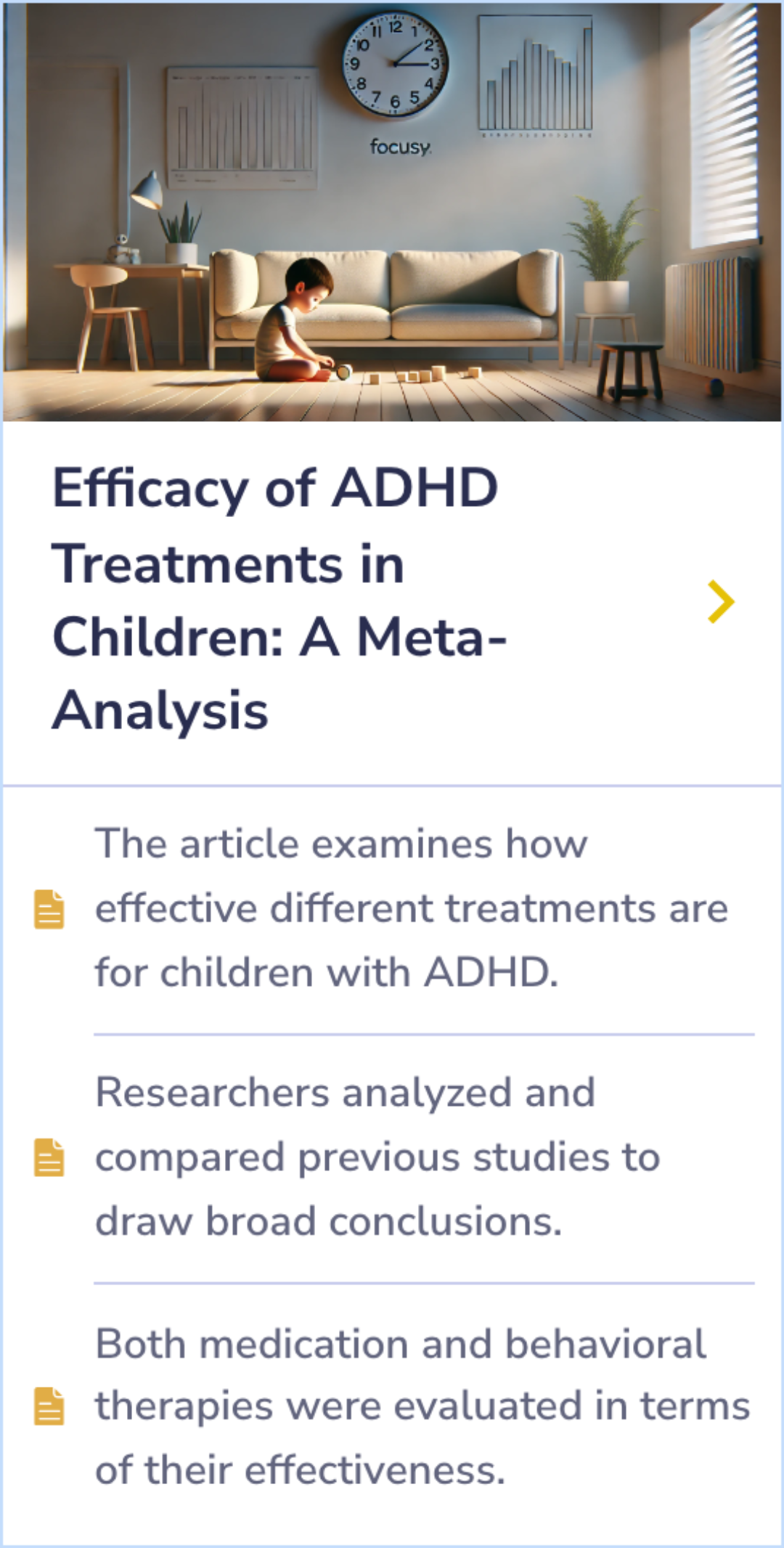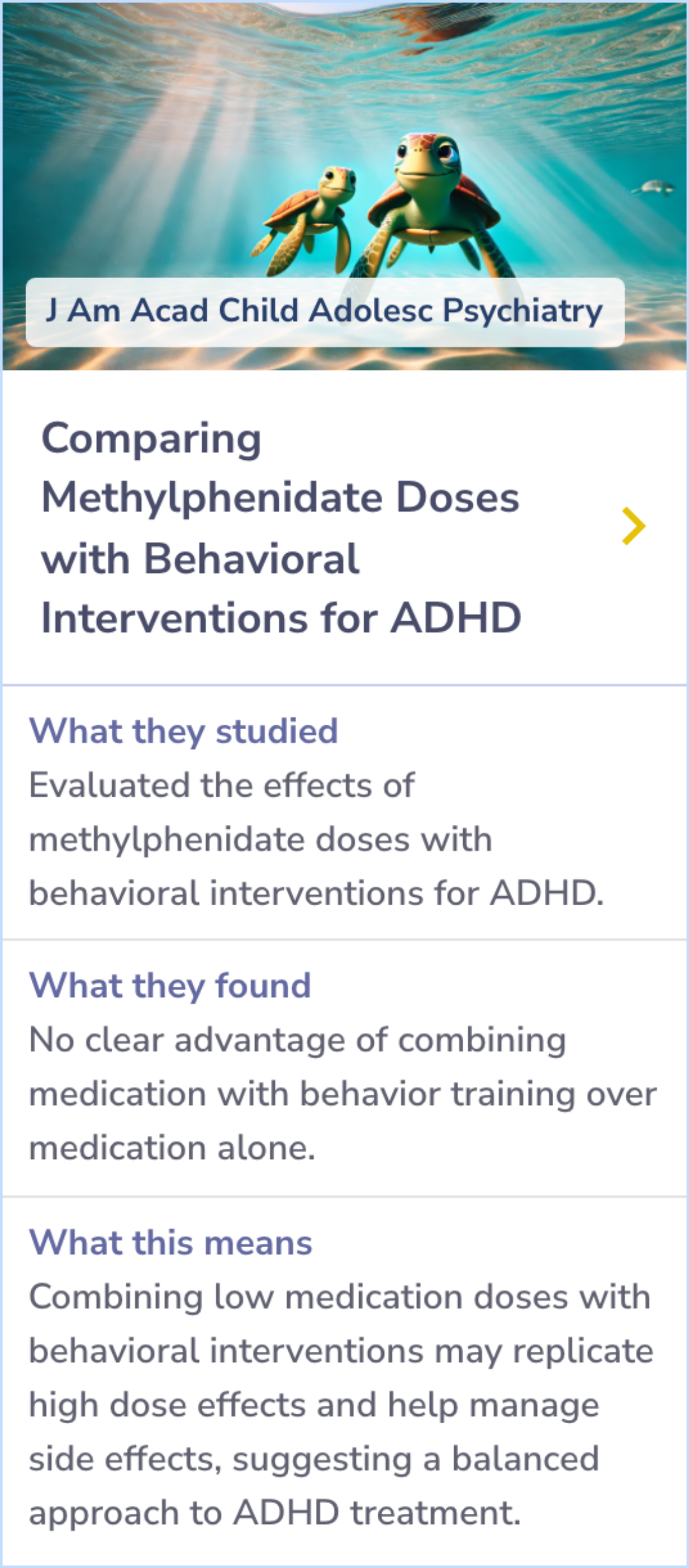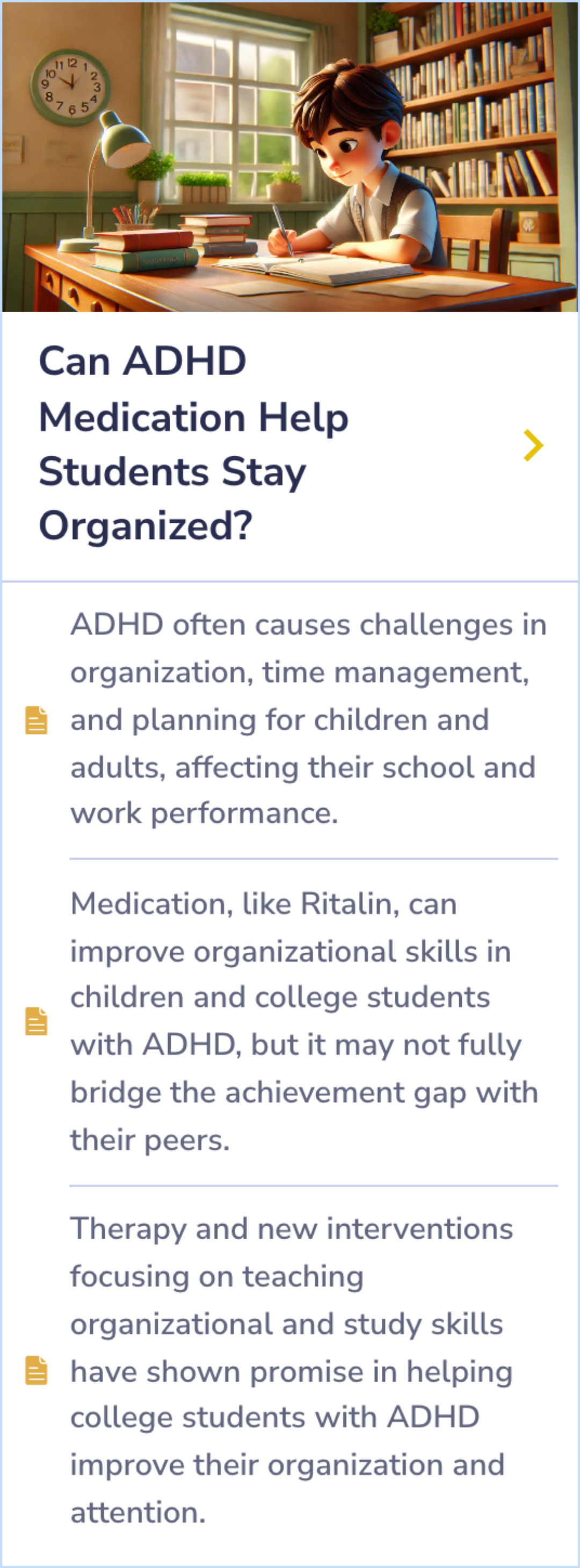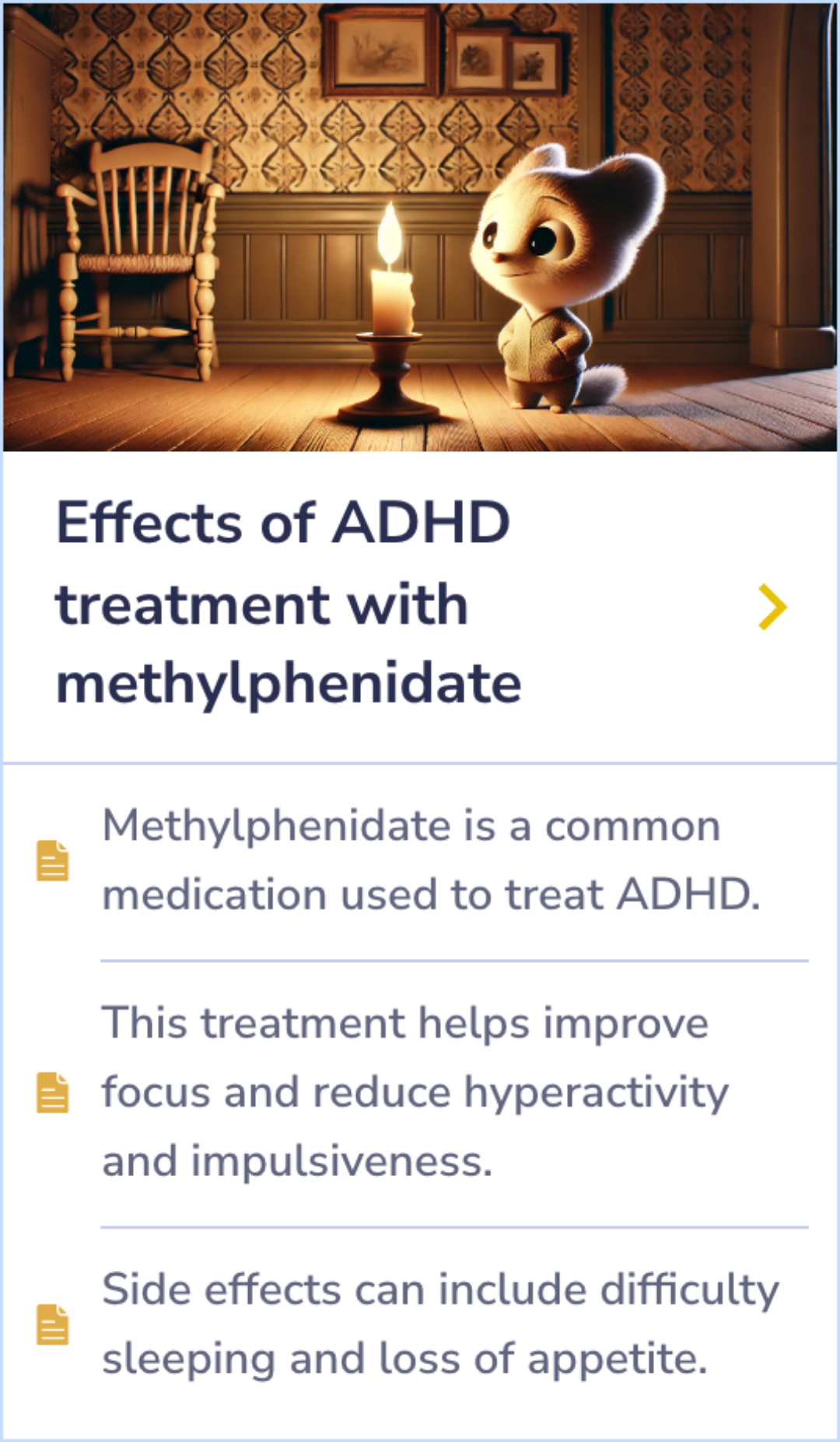Ritalin
Evidence Based Answers
5 Studies on Methylphenidate (Ritalin/Concerta) and Social Functioning
Studies on Ritalin indicate it may help people with ADHD pick up social cues and reduce impulsive behavior, improving relationships and long-term social skills.
Published: October 25, 2024
Click to explore a section:
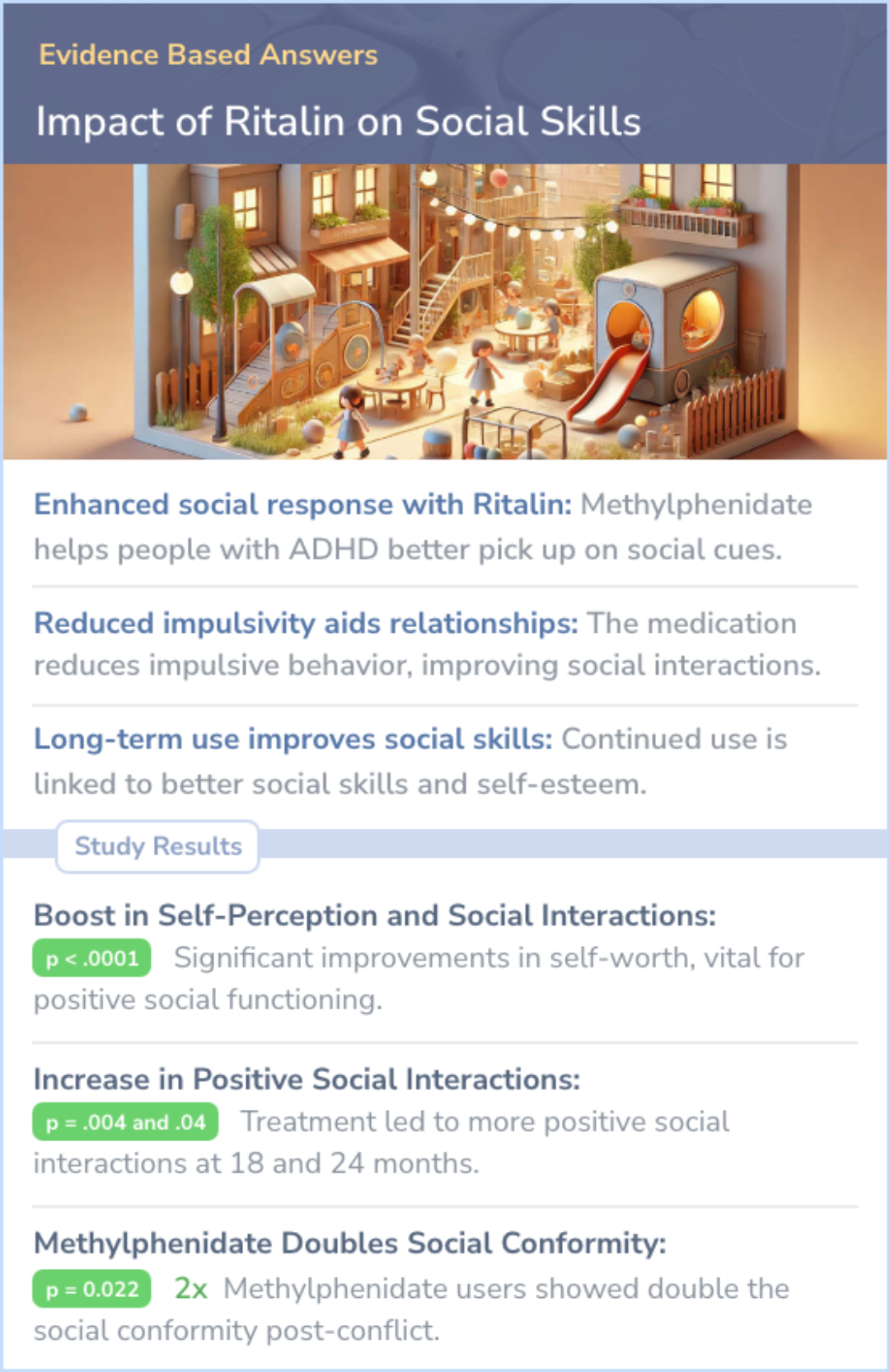
Methylphenidate aids ADHD patients in managing social cues, impulsivity, and social skills long-term.
Studies Summary
💊
Methylphenidate Alone Improves Social Functioning in ADHD
Studies show that methylphenidate improves social behavior in children with ADHD without needing additional psychosocial treatments. Children treated with methylphenidate alone had similar improvements in social functioning as those who received combined treatment.
👥
Methylphenidate Enhances Social Conformity in Moderate Situations
Research indicates that methylphenidate may increase social conformity, particularly in situations where opinions differ moderately. This suggests that the medication may influence how individuals with ADHD respond to social norms.
🧠
Dopamine’s Role in Social Functioning with Methylphenidate
Methylphenidate boosts dopamine levels in the brain, which plays a key role in improving social functioning. By enhancing dopamine signaling, the medication helps individuals with ADHD better focus on social cues and respond appropriately.
Highly Cited Studies
Long term Effects of Methylphenidate in Adults
Peer Reviewed Study 1
Methylphenidate Alone Improves Social Functioning in Children with ADHD
Peer Reviewed Study 2
Methylphenidate and Increased Social Conformity in Moderate Conflicts
Peer Reviewed Study 3
Methylphenidate's Impact on Social Functioning at Home and School
Peer Reviewed Study 4
Effectiveness of Methylphenidate Alone vs. Combined with Psychosocial Treatment
Peer Reviewed Study 5
Study Finds No Added Benefits of Combining Methylphenidate with Psychosocial Treatments for Academic and Emotional Outcomes in Children with ADHD
Background: Methylphenidate and Social Interactions
Methylphenidate, also known as Ritalin and Concerta, is widely used to treat ADHD. It works by increasing the levels of two key brain chemicals, dopamine and norepinephrine, which play a role in attention and focus.
Studies suggest that these effects may help people with ADHD better manage social interactions by making it easier to pick up on social cues and respond appropriately. However, how well the drug works in social situations can depend on the environment.
Studies suggest that these effects may help people with ADHD better manage social interactions by making it easier to pick up on social cues and respond appropriately. However, how well the drug works in social situations can depend on the environment.
“
Source Quotes:
Methylphenidate increases dopamine by blocking dopamine transporters, and this increase is linked to its therapeutic effects, including improvements in social functioning.
The established actions of methylphenidate are at the noradrenaline and dopamine transporters where the drug acts as a reuptake inhibitor to increase the extracellular concentrations of noradrenaline and dopamine, respectively. These actions are believed to mediate the therapeutic effects of methylphenidate, including improvements in social functioning in patients with ADHD.
Background: How ADHD Impacts Social Functioning
ADHD can make it hard for people to focus on social cues, control impulsive behavior, or stay still, which affects relationships. Methylphenidate may improve focus and reduce impulsivity, helping with these challenges.
While it can make social interactions easier, it doesn't solve all social difficulties. However, it may help people engage better by allowing them to concentrate on what’s happening around them.
While it can make social interactions easier, it doesn't solve all social difficulties. However, it may help people engage better by allowing them to concentrate on what’s happening around them.
“
Source Quotes:
Social skills in children with ADHD often are significantly impaired. Problems with inattention may limit opportunities to acquire social skills or to attend to social cues necessary for effective social interaction, making it difficult to form friendships.
Patients with ADHD managed on both medication, and non-pharmacologic treatments have been shown to have higher self-esteem and social functioning skills versus those untreated.
Background: Long-Term Effects of Methylphenidate on Social Functioning
Using methylphenidate long-term has been linked to better social functioning, especially when combined with other treatments like behavioral therapy.
Those who continue using the medication often see improvement in social skills and self-esteem, though the best outcomes come from a combined treatment approach.
Those who continue using the medication often see improvement in social skills and self-esteem, though the best outcomes come from a combined treatment approach.
“
Source Quotes:
In a recent systematic review of pharmacoepidemiological studies, Chang et al. (2019) found that various modalities of drug therapy for ADHD (involving methylphenidate, other stimulants, or atomoxetine) may lead to significant improvements in a number of functional outcomes.
Stimulant medications have been shown to offer symptomatic improvement (particularly in attention and on-task behaviors) as well as improvement in daily functioning (vocational and interpersonal performance) in adults as compared with placebo.
Background: How Methylphenidate Enhances Social Functioning
Methylphenidate affects key brain chemicals like dopamine and norepinephrine, which control attention and emotional responses. These chemicals are often out of balance in people with ADHD.
By helping restore this balance, the drug can make it easier to manage social interactions, though the level of improvement varies among individuals.
By helping restore this balance, the drug can make it easier to manage social interactions, though the level of improvement varies among individuals.
“
Source Quotes:
Methylphenidate influences hyperactivity and behavior largely via a direct effect on key dopaminergic areas of the brain. However, methylphenidate has appreciable effects on norepinephrine reuptake and also binds (albeit weakly) to the serotonin transporter.
The therapeutic effects of methylphenidate are associated with slower increases in dopamine that are maintained over time (tonic changes), which could enhance social functioning by improving attention and motivation.
Peer Reviewed Study
Study: Methylphenidate Alone Improves Social Functioning in Children with ADHD
This study examined whether combining methylphenidate with intensive psychosocial treatment, including social skills training, could enhance social functioning in children with ADHD more than methylphenidate alone. Over two years, 103 children aged 7-9 were monitored and assessed by parents, teachers, and direct observations. The study found no advantage in social functioning for those who received the combined treatment compared to those who only took methylphenidate or received nonspecific psychosocial treatment. All treatment groups showed significant and sustained improvements in social functioning over two years.
The results suggest that while methylphenidate alone leads to improved social behavior in children with ADHD, adding social skills training to the treatment did not provide any extra benefit.
The results suggest that while methylphenidate alone leads to improved social behavior in children with ADHD, adding social skills training to the treatment did not provide any extra benefit.
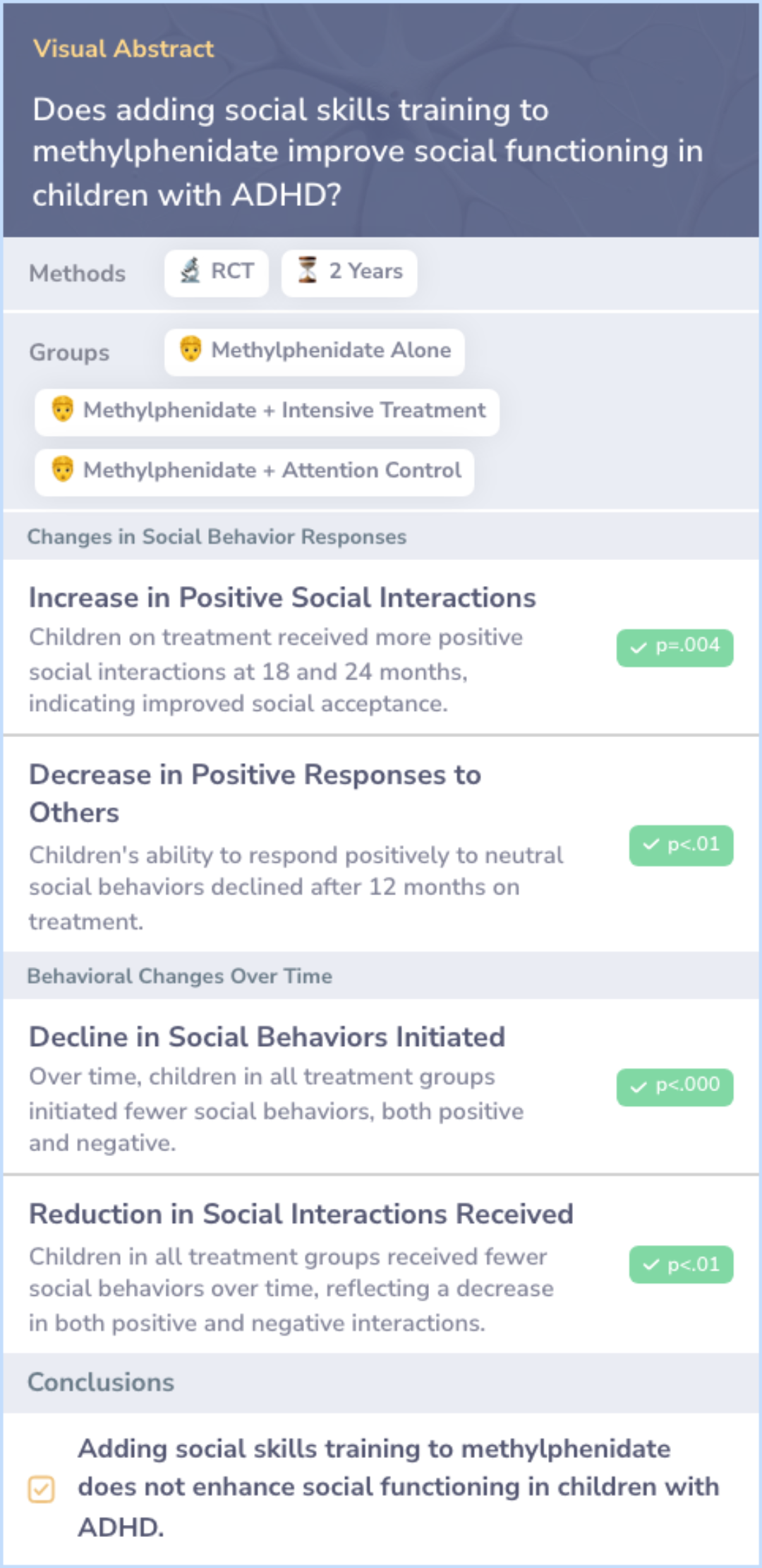
Peer Reviewed Study
Study: Methylphenidate and Increased Social Conformity in Moderate Conflicts
The study explores how Methylphenidate (MPH), a common treatment for ADHD, might affect social behavior. It tests whether MPH influences conformity, the act of aligning with social norms. Participants rated faces for trustworthiness, then saw how others rated them. After taking either MPH or a placebo, they rated the faces again. Results showed that those who took MPH conformed more to the group’s opinion, especially when the differences in opinions were moderate.
However, this increase in conformity was not seen with large opinion differences. The study suggests MPH may boost weak signals that lead to conformity without affecting cognitive tasks.
However, this increase in conformity was not seen with large opinion differences. The study suggests MPH may boost weak signals that lead to conformity without affecting cognitive tasks.

Peer Reviewed Study
Study: Methylphenidate's Impact on Social Functioning at Home and School
This study investigated the effects of methylphenidate (MPH) treatment on children with ADHD over 4 months. It focused on behavioral improvements in different settings: home and school. The results showed that MPH improved symptoms at school in both the morning and afternoon, but similar improvements were not seen at home. Additionally, side effects were more frequently reported by parents, including lack of weight gain and other physical symptoms.
These findings suggest that while MPH helps with school behavior, its effects at home may require adjustments in dosage or combined treatments.
These findings suggest that while MPH helps with school behavior, its effects at home may require adjustments in dosage or combined treatments.

Peer Reviewed Study
Study: Effectiveness of Methylphenidate Alone vs. Combined with Psychosocial Treatment
This study tested if children with ADHD show better improvement when treated with both methylphenidate and intensive psychosocial therapy compared to methylphenidate alone or with control therapy. Over two years, 103 children aged 7-9 were observed through parent, teacher, and psychiatrist ratings, as well as class observations. However, no additional benefits were found with the combination treatment.
All treatments led to significant and stable improvements in ADHD symptoms, but adding psychosocial therapy did not enhance the effectiveness of methylphenidate.
All treatments led to significant and stable improvements in ADHD symptoms, but adding psychosocial therapy did not enhance the effectiveness of methylphenidate.
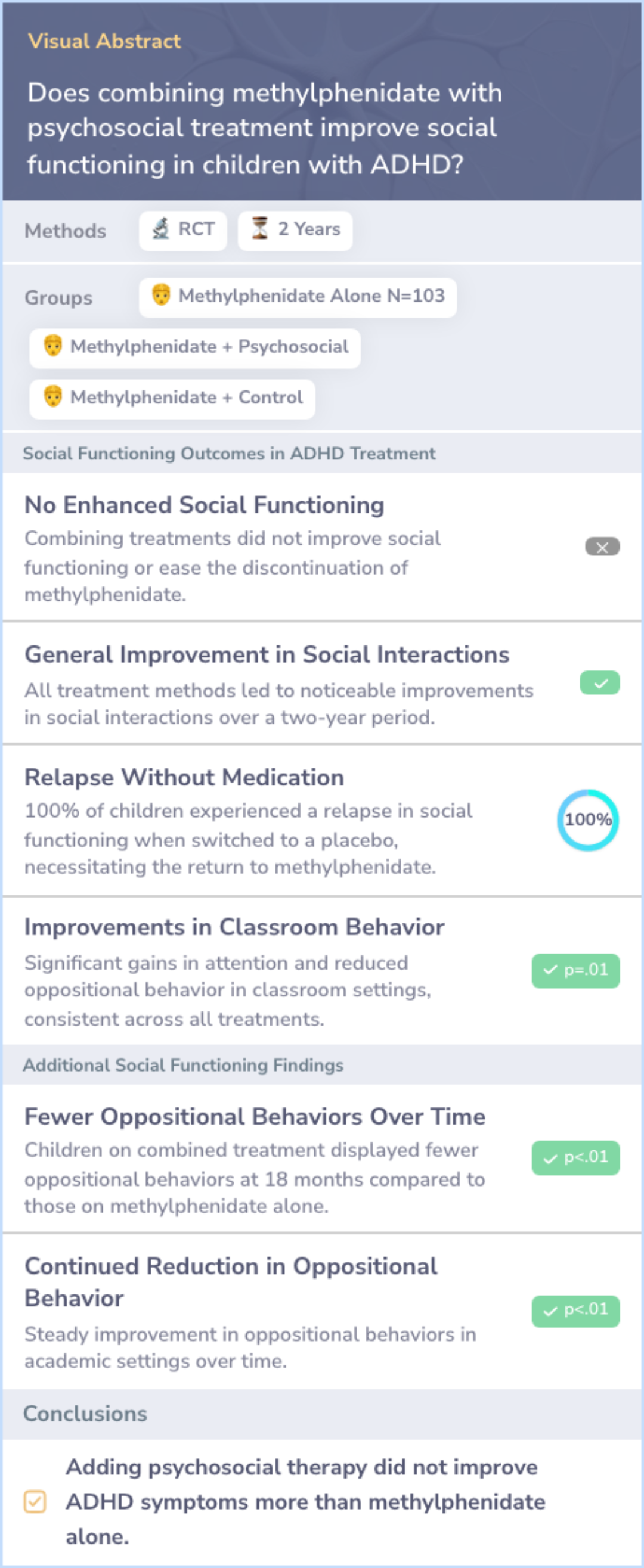
Peer Reviewed Study
Study: Study Finds No Added Benefits of Combining Methylphenidate with Psychosocial Treatments for Academic and Emotional Outcomes in Children with ADHD
This study examined whether adding intensive psychosocial intervention, such as academic support and therapy, to methylphenidate (a common ADHD medication) would improve academic performance and emotional health in children with ADHD. Over 2 years, 103 children were treated with either methylphenidate alone, methylphenidate with psychosocial treatment, or methylphenidate with non-specific attention control.
The results showed no added benefits from the combined treatment over methylphenidate alone. Significant improvements were seen in all groups, and these were maintained for 2 years.
The results showed no added benefits from the combined treatment over methylphenidate alone. Significant improvements were seen in all groups, and these were maintained for 2 years.

Key Takeaways
Conclusions
The studies collectively show that methylphenidate, commonly known as Ritalin or Concerta, significantly improves social functioning in individuals with ADHD by enhancing attention and reducing impulsivity. However, while methylphenidate alone can lead to noticeable improvements, combining it with psychosocial treatments does not offer additional benefits, as demonstrated by multiple studies.
The effectiveness of methylphenidate on social behavior is also shaped by the environment, suggesting that structured settings can amplify its positive impact on social interactions. Overall, the research underscores that while methylphenidate can be a powerful tool in managing social difficulties in ADHD, its success depends on a variety of factors, including the context in which it is used.
The effectiveness of methylphenidate on social behavior is also shaped by the environment, suggesting that structured settings can amplify its positive impact on social interactions. Overall, the research underscores that while methylphenidate can be a powerful tool in managing social difficulties in ADHD, its success depends on a variety of factors, including the context in which it is used.

Evidence Summary
How Methylphenidate Helps Young People with ADHD
Methylphenidate is a commonly prescribed medication for children and teenagers with ADHD. It enhances focus and helps manage impulsive behaviors, which can lead to better school performance and improved social interactions. Doctors often turn to this medication to assist young people in succeeding academically and socially, creating a more structured and supportive environment for them.
By aiding in the control of impulsive actions, methylphenidate allows for smoother and more effective interactions both in academic settings and everyday social situations. This targeted approach can provide substantial benefits for young patients dealing with the challenges of ADHD.
By aiding in the control of impulsive actions, methylphenidate allows for smoother and more effective interactions both in academic settings and everyday social situations. This targeted approach can provide substantial benefits for young patients dealing with the challenges of ADHD.
Evidence Summary
Comparing Treatments for ADHD: Medications vs. Behavioral Therapies
The article evaluates the effectiveness of different treatments for children diagnosed with ADHD by reviewing various studies. Both medications like methylphenidate and behavioral therapies were assessed. Researchers analyzed existing studies to determine how well these treatments work individually and in combination.
The findings offer insights into which methods may be more effective in managing ADHD symptoms, providing valuable comparisons across different treatments.
The findings offer insights into which methods may be more effective in managing ADHD symptoms, providing valuable comparisons across different treatments.
Evidence Summary
Comparing Methylphenidate Doses with Behavioral Interventions for ADHD
96 children with ADHD participated in a study comparing the effects of high and low doses of methylphenidate, both alone and in combination with behavioral parent training and child self-control instruction. Results showed no significant advantage to combining medication with behavioral interventions over medication alone. However, a lower medication dose combined with behavioral interventions achieved similar effects to a higher dose, suggesting a potential approach for managing side effects.
The study reveals that while adding behavioral interventions didn't outperform medication alone, combining lower doses with these behavioral strategies could be beneficial in reducing side effects without compromising effectiveness.
The study reveals that while adding behavioral interventions didn't outperform medication alone, combining lower doses with these behavioral strategies could be beneficial in reducing side effects without compromising effectiveness.
Evidence Summary
ADHD: Challenges and Interventions for Organizational Skills
ADHD often affects organizational skills in both children and adults, impacting academic and work performance. While medications like Ritalin can help improve these skills, they may not fully bridge the achievement gap with peers.
Therapy and targeted interventions show promise, particularly for college students. These approaches help in teaching organizational and study skills, potentially enhancing attention and management of tasks.
Therapy and targeted interventions show promise, particularly for college students. These approaches help in teaching organizational and study skills, potentially enhancing attention and management of tasks.
Evidence Summary
Methylphenidate: Boosting Focus, Reducing Hyperactivity
Methylphenidate helps improve focus and reduces symptoms like hyperactivity and impulsiveness in individuals with ADHD. It's known for its effectiveness, yet it can cause side effects such as difficulty sleeping and loss of appetite.
Despite these side effects, its role in enhancing attention and reducing hyperactivity makes it a common choice for ADHD treatment. These improvements aid in better social functioning, as seen in previous research.
Despite these side effects, its role in enhancing attention and reducing hyperactivity makes it a common choice for ADHD treatment. These improvements aid in better social functioning, as seen in previous research.
